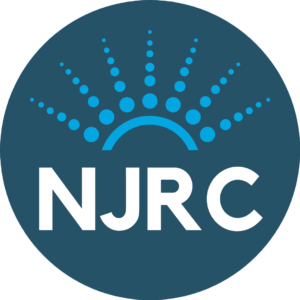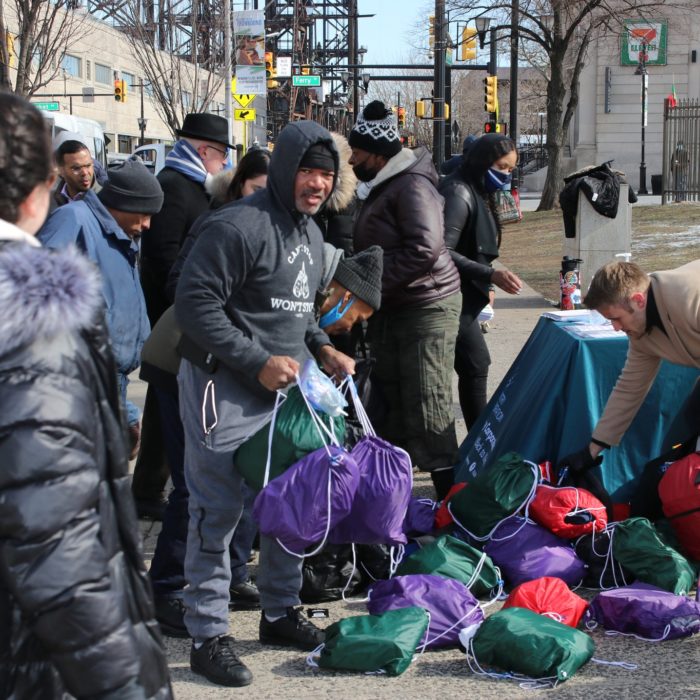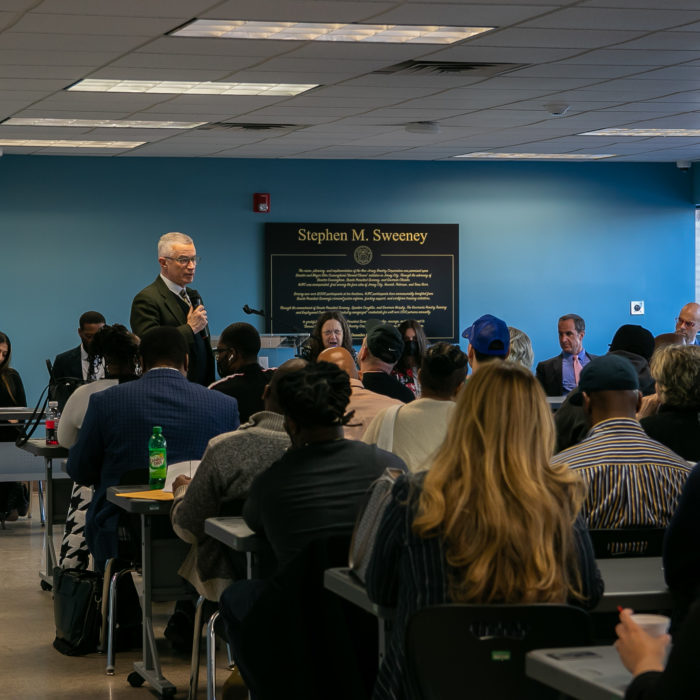New Jersey Reentry Corporation (NJRC)
About New Jersey Reentry Corporation (NJRC)
The NJRC is premised on the ambition to create an environment which promotes pro-social norms, encouraging the establishment of attachments to positive rehabilitative cultures, strengthening bonds among peers who promote positive norms and values, and promoting family reunification. Participants receive individualized assessments and treatment plans that first address essential needs, including housing, treatment, mental health care, medical care, and access to health insurance and other public benefits to secure these essential needs.
The daily expense of supervising a probationer is twenty times less than the average expense of incarcerating an individual in prison or jail. The costs of imprisonment is increasing while the benefits are decreasing substantially. Our capacity to secure public safety for our communities depends upon our ability to improve management to the thousands of individuals in New Jersey who are under probation and/or parole supervision. Proper recognition must be given to persons without resources as post-release success frequently depends on the quality and services amongst support provided within a community.
Furthermore, gainful employment is the most critical aspect of post-prison reentry. Job training, employment counseling, as well as employment placement programs are essential tools for effective reintegration and workforce development.
The NJRC was developed subsequent to the successful implementation of a pilot reentry model in Hudson County/Jersey City in 2014 with the support of Governor Christie’s administration. The Hudson County/Jersey City reentry model was initiated through a series of strategic partnerships between the Hudson County Department of Corrections (HCDOC), the New Jersey Department of Family Services (DFS), and local non-profit providers. Also included are the Jersey City Employment and Training Program (JCETP) and Integrity House, a substance abuse treatment provider, both agencies with decades of experience of experience serving court-involved individuals.
The HCDOC recognized that addressing the need for addiction treatment and successful return to society would result in improved public safety and established a Community Reintegration Program funded in part by a federal Second Chance Act grant. The program has been recognized by the United States Department of Justice Bureau of Justice Assistance and the National Institute of Justice “as being at the forefront of the reentry field.” The project is one of only seven in the country to be included in a gold standard evaluation by the National Institute of Justice.
Mission
Putting Our Community Back to Work. The NJRC works with returning citizens, employers, and community partners to remove barriers to employment so that everyone in our community can be safer, healthier, and better employed.
Values
The NJRC Values:
- We Believe in Second Chances
- Set the Stage For Employment: Clients are Sent to Jobs When They’re Ready
- Clean Body, Clean Mind, Clean Job: Clients Need Sobriety, Health, Stability and Good Jobs
- Seeing the Whole Client: Clients Need More than Just Job Options, They Need Help Putting all the Pieces Together for a New Life
- Data Is Our Friend: We Capture Everything So We Know What Works and What Doesn’t
- Clients Are Individuals: We Focus on What’s Right for Each Particular Client
- Time Is Everyone’s Greatest Resource: We Work Efficiently to Get Our Clients Back to Work Quickly
- Safety is Paramount: We Never Put Our Clients or Employees at Risk
Vision
The NJRC strives to develop a culture where people with histories of incarceration face no barriers to employment and are no more likely to be arrested than people who have not been incarcerated.
Culture
The NJRC is a professional job and training procurement agency with a sensitivity to the unique needs that returning citizens have in finding and retaining quality employment. The NJRC is evidence based, efficient, collaborative, apolitical, client focused, data driven, and its employees at all times comport themselves accordingly.
Locations and Contacts:
- Union County
214-A Commerce Place
Elizabeth, New Jersey 07201
Phone: 551.256.7879
Fax: 201.604.7172
Facility Director:
Elizabeth Granovsky, 551.256.7872 - Bergen County
39 Hudson Street, Suite 404
Hackensack, New Jersey 07601
Phone: 551.256.7897
Fax: 201.604.6973
Facility Director:
Robert Carter, 551.256.7896 - Monmouth County
72 Morris Avenue, 2nd Floor
Neptune City, NJ 07753
Phone: 848.217.7455
Fax: 201.604.7403
Facility Director:
Darlene Tyler, 848.217.7449 - Middlesex County
57 Livingston Avenue, Unit 3
New Brunswick, New Jersey 08901
Phone: 732.509.9304
Fax: 201.604.6771
Facility Director:
Tasha Hogan, 732.509.9292 - Essex County
936-938 Bergen Street
Newark, New Jersey 07112
Phone: 973.982.6896
Facility Director:
Jennifer Peña, 973.982.6888 - Passaic County
66 Hamilton Street, Suite 201
Paterson, New Jersey 07505
Phone: 551.256.9062
Fax: 201.604.5420
Facility Director:
Jennifer Peña, 973.982.6888 - Ocean County
310 Main Street, Suite 3B
Toms River, New Jersey 08753
Phone: 848.238.7000
Fax: 201.604.5433
Facility Director:
Brian McGillivray, 848.238.7006
Veterans Justice Outreach Initiative
The Veterans Justice Outreach Initiative of NJRC works to provide critically-needed services to those veterans, regardless of discharge status, who are being released from state prison, county jail, or addiction treatment centers. Veterans Justice Outreach Initiative also works with court-involved veterans who have not been imprisoned, but who have been engaged with the criminal justice system. This program is designed and executed to assist those veterans to secure medical and behavioral treatment for health ailments, mental health problems, and addiction. NJRC seeks to decrease the participation of veterans with the court system and provide them with the necessary support mechanisms through affiliated veterans organizations, hospitals and healthcare providers, and advocacy groups to offer the treatment and tools necessary for grappling with challenges ranging from anxiety, depression, and Post-Traumatic Stress Disorder (PTSD).
Recognizing that veteran disability compensation is reduced if a veteran is convicted of a felony and imprisoned for more than sixty (60) days, veterans may be limited to a lower disability rate. Among imprisoned veterans, it is estimated that 87% have experienced a lifetime traumatic event and upwards of 39% have screened positive for PTSD (Saxon et al., 2001). In addition, exposure to combat and other traumatic situations may have occurred during military service; these court-involved military veterans have been considered a vulnerable population warranting coordinated interdisciplinary healthcare because of unique demanding healthcare needs. While significant healthcare delivery gaps presently exist for court-involved veterans within New Jersey, mindful of the unique challenges of the management of multiple conditions and psychosocial challenges, as well as the difficulty in designing an integrated medical framework, NJRC is focused on providing for those medical and behavioral healthcare interventions that help veterans manage multiple mental health, substance use disorder, and medical conditions.
Those court-involved veterans have extensive medical and behavioral (mental health and substance use disorder) treatment needs. According to the Health and Justice Journal, “Among veterans age 55 and older who were exiting prison, 50% had hypertension, 20% had diabetes, and 16% had hepatitis,” (Williams et. al., 2010). “The mortality rate among veterans exiting prison is approximately similar to those of nonveterans exiting prison, namely 12 times higher from that of the general population, with overdose as the leading cause of death,” (Wortzel, Blatchford, Connor, Adler, and Binswanger, 2012). In addition to the healthcare needs, court-involved veterans face a wide range of biopsychosocial challenges, for which NJRC is uniquely positioned to address. While 30% of veterans imprisoned have a history of homelessness, a significant percentage confront legal restrictions in employment, criminal background checks, as well as competing medical and behavioral health conditions.
Traumatic experiences and Post-Traumatic Stress Disorder have historically been linked with criminal justice involvement, which may explain the link between military service and criminal behavior. Among veterans in prison, 58% of men and 38% of women have served in the combat zone. Exposure to more traumatic events during military service and PTSD were linked with a higher risk of violent offending among veterans. It should be noted that PTSD symptoms have been linked with interpersonal violence and other court involvement among veterans.
In addition, substance use disorders have been linked with a recidivism among court-involved veterans and post-deployment alcohol use has been associated with violent offending among veterans. Among U.S. veterans who served in the recent conflicts in Iraq or Afghanistan, conflict-related PTSD was linked with a high rate of incarceration. The substantive research, commentary, and conclusions were taken from the research article entitled “A Scoping Review of Military Veterans Involved in the Criminal Justice System and their Health and Healthcare,” written by Finnely, Owens, and Timko, published on April 8, 2019 in Health and Justice. NJRC is committed to providing the health treatment needs, housing referrals, workforce training and maintenance of employment, legal services, and identification for court-involved veterans.
In working with allied veteran organizations, the VHA, and service providers, NJRC is committed to programming that will be responsive to the priorities of court-involved veterans. To the extent that existing services across multiple fields fail to address veteran needs, NJRC is committed to ethically supply those peer-reviewed best practices to veterans through NJRC and private foundation sources.
Tell Roger About Your Experience
We'd love to hear about your experience with this organization. Please consider leaving a review to help us make Roger the best resource for veterans.
Leave a Review





